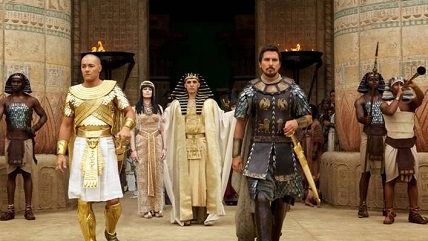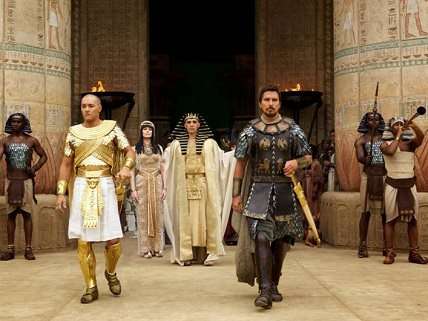Exodus: Gods and Kings
Ridley Scott casts Christian Bale into the blockbuster wilderness.


Ridley Scott has been getting a lot of stick lately for his ethnically incorrect casting of Exodus: Gods and Kings. But that's not the movie's real problem. Real Egyptian actors were even thinner on the ground in The Ten Commandments, Cecil B. De Mille's 1956 take on the same Biblical tale treated here. De Mille had no reservations about casting such outlanders as Cedric Hardwicke and Yvonne De Carlo in his film, and, in the central role of Moses, the definitively incorrect Charlton Heston. But then De Mille was operating in an industry in which established stars were seen as a necessary hedge against the expenditure of vast sums of money. This sort of bottom-line calculation became a Hollywood tradition. It may now be outdated, but it seems a little unfair to come down too hard on Scott for continuing it in support of a picture that's said to have cost some $140-million. In any case, the movie's other shortcomings are more crucial.
The story is so familiar that cynics might wonder why a pressing need was felt to retell it. It's set in 1300 BC, in the Egyptian capital of Memphis, and recounts the life of Moses (Christian Bale), a Hebrew foundling unwittingly adopted as a baby by the Pharaoh Seti (John Turturro), who raises him alongside his biological son, Ramses (Joel Edgerton). Growing into manhood, Moses becomes troubled by the misery of the stateless Hebrews who have been enslaved by the Egyptians for 400 years. When his own Hebrew heritage is uncovered, Moses is cast out into the desert, where he is visited by the God of the Israelites and commanded to return to Egypt to free his people and lead them to the Promised Land.
The actors are famously talented, and they engage with their characters as best they can. But their performance styles are at odds throughout, and the story's overtones of Sunday-school pageantry are hard to dispel (at some points, everyone seems to be playing dress-up). Bale is an unmistakably contemporary presence; and Edgerton, with his shaved head, kohl-rimmed eyes and melancholy pout, suggests a drag queen who's misplaced his wig. Turturro brings an easy warmth to his portrayal of Seti, but he's handicapped, through no fault of his own, by our realization that he is John Turturro, and he's playing an ancient pharaoh, and it's a little weird. There are also peripheral appearances by Ben Kingsley, as a tiresomely murmurous Hebrew elder, and, in a truly thankless role, Sigourney Weaver as the overdressed Queen Tuya, upon whose head a blue-feathered bird appears to have settled and died.
The actors are further challenged by some of the dialogue, which has been worked up by four different writers. When Moses implores Ramses to set the Hebrews free, Ramses, who prizes their slave labor, replies, "From an economic standpoint, what you're asking is problematic at least." Clearly we're not in Memphis anymore.
The movie's pacing manages to be both sluggish and hurried at the same time. Scott is most at home with big set-piece action scenes featuring complex camerawork and elaborate digital effects, and there's plenty of that here. When Ramses and Moses lead Egyptian forces into an early battle with the Hittites, we're given a wild 3D onslaught of careening chariots, clanging swords and swarms of arrows flying through the sky. Later, when God brings down a series of plagues upon the Egyptians, the director really hits his stride, unleashing hordes of frogs and locusts and man-eating crocodiles that turn the Nile red with the blood of their victims. (Unfortunately, while the parting of the Red Sea—the famous event toward which all this tumult is leading—is an impressive CGI workout, it's also oddly underwhelming: Moses cleaves the waters by tossing his sword into them, and then there's a really big wave.)
A lot of this is great stuff. But there's so much of it that the basic Moses story has to be tightly compressed, presumably to keep the movie's run-time down to an already overlong two and a half hours. After Moses is exiled from the Pharaoh's palace, we see him wandering in the desert. He comes to an oasis, meets a beautiful girl named Zipporah (Maria Valverde), and in very short order they marry and have a child, who in even shorter order grows into adolescence and warns his father not to climb a certain sacred mountain.
Scott makes an interesting choice here. Moses does climb the mountain, of course, but the God he meets upon it doesn't take the traditional form of a burning bush; instead we find Him incarnated by a 10-year-old boy (Isaac Andrews). This works, I think—the glowering Andrews is a very Old Testament tyke. Not everyone may buy it, though. And when the movie tosses off the story's concluding business with the stone tablets and the Ten Commandments as little more than an afterthought, even long-term Ridley Scott admirers may find themselves suffering a loss of faith.